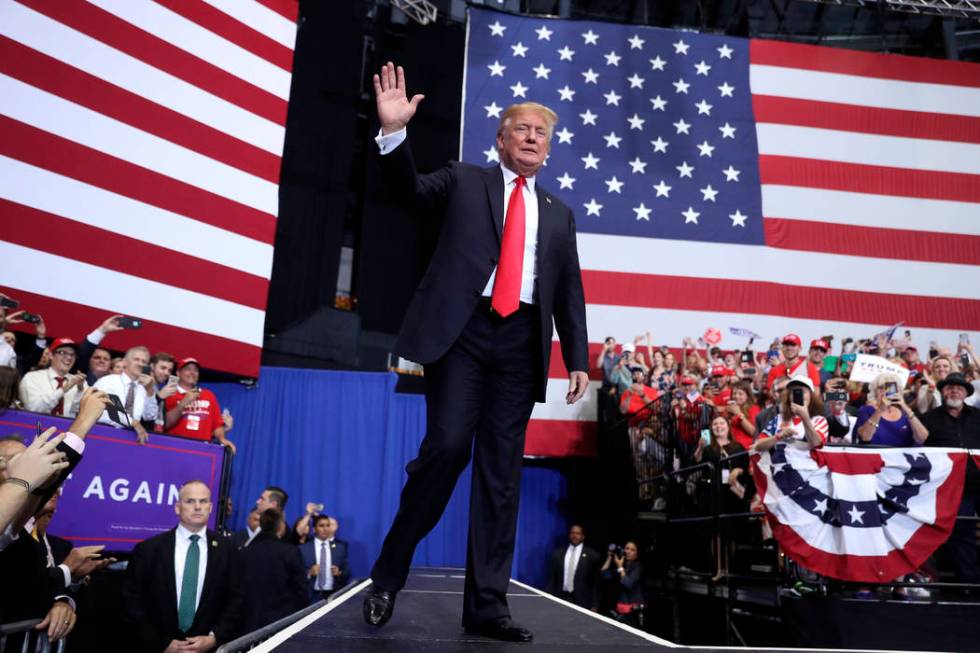White House expects summit with North Korea to take place

WASHINGTON — A week after canceling a June 12 summit in Singapore with North Korean leader Kim Jong Un, President Donald Trump behaved Tuesday as if the event was on again.
“We have put a great team together for our talks with North Korea. Meetings are currently taking place concerning Summit, and more,” Trump tweeted Tuesday.
On a flight to Tennessee aboard Air Force One on Tuesday, White House Press Secretary Sarah Sanders told reporters that Trump’s letter last week canceling the summit had left the door open for a meeting.
“And again, we expect it to take place,” Sanders said. “But we’ll see what happens. We’re going to be prepared. If it takes place on June 12th, we’ll certainly be prepared. If it for some reason takes place at a later date, we’ll be prepared for that as well.”
Sanders added, “Denuclearization has to be on the table and the focus of the meeting. And the president has to feel like we’re making progress on that front.”
Earlier Tuesday, Sanders announced four meetings in anticipation of the first summit between an American president and a North Korean leader.
According to Sanders, Trump will meet with Japanese Prime Minister Shinzo Abe at the White House on June 7 to discuss developments in North Korea; Secretary of State Mike Pompeo will meet later this week with Kim Yong Chol, North Korea’s vice chairman of the Central Committee, in New York; a U.S. delegation is meeting with North Korean officials in the DMZ; and White House Deputy Chief of Staff Joe Hagin is meeting in Singapore to coordinate logistics with officials from Pyongyang.
Earlier this month North Korean officials snubbed Hagin and a White House advance team that had traveled to Singapore — only to be stood up. Nonetheless Hagin returned to the city expected to host the Trump-Kim summit.
Pompeo’s meeting with Kim Yong Chol will be his third, as he was present during Pompeo’s two recent meetings with North Korea’s leader. He will be the highest-level North Korean official to travel to the United States since 2000.
State Department spokeswoman Heather Nauert told reporters she thought the New York session was “pretty impressive” considering “where we were one year ago.” Asked if the Singapore summit would occur on June 12, she answered, “That is what we’re planning for, but we’ll see what happens.”
The U.S. delegation at the DMZ includes U.S. Ambassador to the Philippines Sung Kim, Allison Hooker of the National Security Council and Randy Schriver of the Department of Defense.
There is no ambassador to South Korea. Trump left the position vacant for 16 months before nominating Navy Admiral Harry B. Harris to the post last week.
“I do think the North Koreans want this to happen,” said foreign policy analyst Eric Gomez of the Libertarian-leaning Cato Institute. North Korean officials did not call Trump names as they poked him before he canceled the summit, and their put-down “never came from Kim Jong Un himself,” Gomez said.
As for the June 12 date, Gomez sees a “good chance of that happening,” although like many other Korea watchers, he thinks a delay could serve all sides well by providing more time to iron out policy differences.
Kim surprised the international community by inviting Trump to a face-to-face meeting. Trump then surprised the world by agreeing to a meeting as early as May. That timetable was later extended to June.
Late last week, Trump abruptly called off the summit after North Korea called Vice President Mike Pence a “political dummy” and threatened a “nuclear-to-nuclear showdown.”
“I was very much looking forward to being there with you,” Trump wrote in a one-page letter to Kim. “Sadly, based on the tremendous anger and open hostility displayed in your most recent statement, I feel that it is inappropriate, at this time, to have this long-planned meeting.”
Sanders said that since the letter, “the North Koreans have been engaging” with the U.S.
“Solid response to my letter, thank you!” Trump tweeted Tuesday.
A new twist developed Tuesday when the Trump administration issued a fresh warning about malicious North Korean cyber activity.
The technical alert from the FBI and the Department of Homeland Security highlighted two pieces of malware said to have been used to target U.S. infrastructure and aerospace, financial and media companies for at least nine years to steal information and remotely manipulate networks.
The U.S. government has identified more than 85 compromised networks.
Contact Debra J. Saunders at dsaunders@reviewjournal.com. Follow @DebraJSaunders on Twitter. The Associated Press contributed to this report.